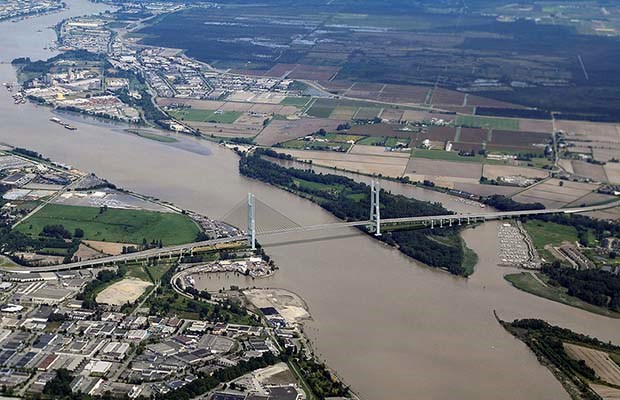Port Metro Vancouver wants the province to build a higher bridge when it replaces the Massey Tunnel to allow taller LNG tankers to travel up the Fraser River, according to documents obtained by an environmental group.
Port officials suggested the bridge's air draft - the clearance for a ship between the water line and the bridge deck - be 65 metres high, rather than the 57 metres proposed by the province, according to internal port documents written over the past two years. The documents were obtained through freedom-ofinformation requests by Voters Taking Action On Climate Change and shared with The Vancouver Sun on Thursday.
An internal email between port staff suggests the port's 65-metre figure is based on the height clearance requirements for the biggest LNG tankers that could turn in the river. The port also acknowledges that a higher bridge would be much more expensive and that the province is sticking to a proposed 57-metre air draft (the same as the Alex Fraser Bridge, which means taller ships travelling under a higher Massey bridge would be able to go as far as Delta terminals).
In a July 2014 email to staff, Port Metro CEO Robin Silvester inquires about the air draft of the largest LNG vessel that could travel up the river. Port marine operations director Chris Wellstood said a 63-metre air draft (plus a two-metre safety buffer requirement) would be enough for the largest LNG tankers up to 320 metres long to pass under the bridge. Staff also acknowledge there are challenges associated with "high costs" to achieve the port's proposed height of 65 metres.
In an interview Thursday, Port Metro Vancouver planning and operations vice-president Peter Xotta acknowledged there are higher costs, but said the height
must take into consideration future trade on the Fraser.
"We're talking about infrastructure and assets that could be around for 100 years ... we want to make sure that what we are asking is not just a whim. So we did some analysis of a broad slate of vessels - and it's very difficult to predict what vessels are going to look like in 50 years - but in order to preserve as much flexibility as possible we'd like bridges, constraints, to be as broad as possible," he said.
The 65-metre estimate was based on the Solstice-class cruise ship, which has a height of 61 metres, and so when staff factored in tides and international overhead safety clearance of two metres, they came up with the 65-metre request. At the time, the port was looking into options for a future cruise terminal on the Fraser River, but that idea is not now under consideration.
Asked whether the port would share costs of a higher bridge, Xotta declined to comment.
The port has long been advocating the Massey Tunnel replacement because of portrelated traffic congestion in the tunnel and the constraints on deepwater vessel traffic. For years, the port has cited the prebuilt sectional tunnel's shallow draft as a major impediment to expanding commercial river traffic by dredging.
The B. C. government announced last spring it would replace the Massey Tunnel with a bridge, but has yet to release the size and scope of the new crossing.
Construction on the new bridge over the south arm of the Fraser River between Richmond and Delta is expected to begin in 2017.
The province said it has been having discussions about the height of the bridge and the needs of marine traffic with a number of agencies, including Port Metro Vancouver and Transport Canada.
"The draft needed for the safe movement of LNG tankers up the Fraser River has been a part of these discussions, because we know LNG is an important export opportunity for British Columbia," said B.C. Transportation Ministry spokeswoman Sonia Lowe in an email.
"The project definition report will include information about the project scope as well as estimated costs and a business case. This will be available for public discussion in the coming months," Lowe said.
The largest LNG tankers, carrying more than 267,300 cubic metres of liquefied natural gas, require 64.4 metres of air draft, while an average tanker with a more than 142,400-cubic-metre capacity requires an air draft of 50.4 metres, according to the port's documents.
Kevin Washbrook, spokesman for Voters Taking Action, said in making the documents public he hoped the public would be more included in any discussion about trade on the Fraser River.
"There seems to be no coherent discussion about the future of the lower Fraser River. There is one proposal after another going forward from plans to build a coal port to an LNG terminal and larger LNG ships going upstream. When is it enough? And when do we as the regional public get to have our say? We need a plan for what the Fraser is going to look like in 10 or 20 years."
Wespac Midstream Tilbury received an NEB license on May 7 for its proposed LNG export terminal in Delta, one of more than a dozen proposed LNG projects in B.C. The terminal would be near the existing Fortis B.C. LNG facility on the Fraser River.
For more stories, go to vancouversun.com



